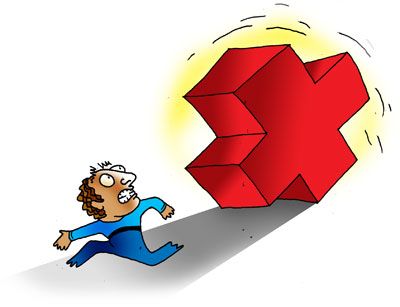People in the age group of 25+ to 35 years have a common misconception that even diabetes, thyroid, cholesterol are not common in this age group.
Illustration: Dominic Xavier/Rediff.com
 'I'm still young, how can I have diabetes?'
'I'm still young, how can I have diabetes?'
'I am just 30, how can I have osteoporosis?'
Most people have misconceptions regarding certain health issues which, according to them, are just age-related. And it is because of these perceptions that people avoid getting regular check-ups done.
'The kind of people I have come across, most of them have a perception that many problems or health issues are age related and there is no need to undergo any tests as of now.
'For instance, orthopedic problems are often understood as an old age problem, but with the kind of lifestyle we are living -- sedentary lifestyle, long hours of sitting, poor diet, excessive stress -- many people are diagnosed with cervical problems, lower back ache and other rheumatoid conditions.
'Such conditions among youngsters in the age group of 25-32 are on a rise with good percentage,' said CA (Dr) Ruchi Gupta, Founder and CEO, 3hcare.in.
People in the age group of 25+ to 35 years have a common misconception that even diabetes, thyroid, cholesterol are not common in this age group.
But upon conducting all the tests, all the levels were abnormal and are totally unacceptable by them at all.
There are many things that may not show any symptoms while in early stages and if you go for a diagnosis only when the symptoms are prominent then the time wasted will prevent timely diagnosis in treatment.
This is where preventive care is beneficial and everyone should go for frequent checkups as we do not know what our body behaves like.
It is not mandatory that if you are lean, your cholesterol levels may be normal.
Myth 1: Blood tests are for unhealthy people and I don't need them. They don't mean anything and the levels are inaccurate.
Fact: There are many things that may not show any symptoms while in early stages and if you go for a diagnosis, only then the symptoms are prominent.
Frequent checkups provide the body behaviour and a preventive care.
Many people with such myth get flawed when they undergo blood tests.
The results would indicate deficiency far outside the healthy range.
Regarding the accuracy of the results, many believe that the results are not correct as they think nothing is wrong about their lifestyle or diet.
But the fact is that these blood tests accurately show clinical disease as well as indicates an idea of where your health is trending over the tested period.
Regular tests can be a very effective tool for monitoring health for preventive reasons.
Myth 2: Many illness or conditions like diabetes, thyroid or cholesterol are for the elderly.
Fact: People in the age group of 25 to 35 years have a common misconception that even diabetes, thyroid, cholesterol are not common in this age group.
With changes in the living habits like sedentary lifestyle, poor dietary intake, excess office stress etc, people have become less immune to diseases, irrespective of the age factor; even the younger generation has started acquiring such conditions.
Myth 3: Do not eat sugar one night before the diabetes check up for normal results.
Fact: Diabetes is a gradually developing process and it has nothing to do with rise in blood sugar levels if you consume sweets before the test.
The test results will only indicate high glucose levels in the blood if one is actually having any disturbances in the sugar levels.
It should be noted that people with a family history of diabetes must have this checkup on regular basis, as the risk for getting the conditions are high.
Myth 4: Kids under the age of 5 have a good diet, no stress, no sedentary lifestyle so they cannot be deficient in Vitamin D.
Fact: Vitamin deficiency is one of the most common problems and is not age related.
Over 80-90 per cent of the people are Vitamin D deficient, that also include kids under the age of 5.
One should understand that these problems may not be age related but can happen with anyone.
We also tend to believe that by providing enough balanced diet like milk, curd, calcium and other related supplements and minerals etc., deficiency cannot happen.
But we tend to forget the fact that Vitamin D deficiency has very little to with dietary intake.
Many factors influence its deficiency like living style, place you live at, the kind of atmosphere one is in etc.
Myth 5: All diagnostic imaging methods involving radiation and x-rays are dangerous for pregnant women.
Fact: Though it is true that certain imaging methods like X-ray, CT scan, catheterization and mammography involves radiation, but other methods like ultrasound and MRI scans are radiation free.
In case of pregnant women, it is advisable not to undergo abdominal scan during the first trimester when the fetal organs are still developing as the radiations can be harmful.
But in emergency conditions, scans can be performed by taking necessary precautions.
The thing is that the abdomen should be completely protected with lead apron and chest X-rays can be done freely.
Depending on the situation and symptoms, quality labs and practitioners will suggest the best possible ways of diagnosis.
Myth 6: All radiologic diagnostics are with radiations and are dangerous for health.
Fact: Not all radiologic machines work upon the principle of radiations like MRI and ultrasound.
However, due to the fact that they may be a bit time consuming procedures, in cases where instant diagnosis is required, the speed of reaction is very less.
Only in such cases, other equipments like X-rays come into picture.
The physician obeys all the rules to ensure patient safety and avoid unnecessary scans or prefers radiation free scanning or with the least possible dose. Getting radiologic diagnosis once in a while doesn't affect any organ of the body.











 © 2025
© 2025